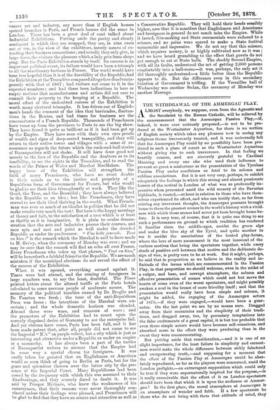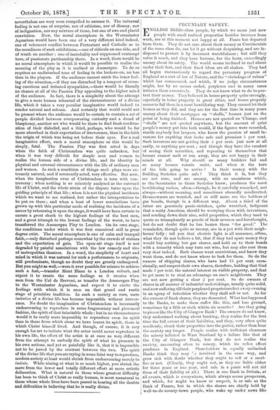THE WITHDRAWAL OF THE AMMERGAU PLAY.
ALMOST everybody, we suppose, even from the Agnostic and the Secularist to the Roman Catholic, will be relieved by the announcement that the Ammergau Passion .Play,—;if, indeed, it were ever seriously proposed,—is not to be pro- duced at the Westminster Aquarium, for there is no section of English society which takes any pleasure now in seeing any religious theme irreverently treated, and it was universally felt that the Ammergau Play could by no possibility have been pro- duced in such a place of resort as the Westminster Aquarium without giving rise to such irreverence. In that feeling we heartily concur, and are sincerely grateful to Cardinal Manning and every one else who used their influence to prevent so great a misfortune as the presentation of the Tyrolese Passion Play under conditions so fatal to its solemn and sublime associations. But it is not very easy, perhaps, to exhibit adequately the feelings in which this strong and almost passionate horror of the revival in London of what was so profoundly im- pressive when presented amid the wild scenery of the Bavarian highlands, is rooted,—at least in relation to those who have them- selves experienced its effect, and who can testify that, so far from stirring any irreverent thought, the Ammergau peasants brought home to them the greatest scenes in the world's history with a vivid- ness with which those scenes had never yet been brought home be- fore. It is very true, of course, that it is quite one thing to see such a performance on ground to which tradition has rendered it familiar since the middle-ages, amidst the green alps and under the blue sky of the Tyrol, and quite another to see it amidst the associations of the heated play-house, where the love of mere amusement is the most innocent of the various motives that bring the spectators together, while every shade of positive evil between that motive and the deliberate de- sign of vice, is pretty sure to be at work. But it might, perhaps, be said that in proportion as we believe in the reality and in- finitude of the issues which are commemorated in the Passion Play, in that proportion we should welcome, even in the midst.of a vulgar, and base, and corrupt atmosphere, the solemn and effective presentation of scenes which could not but move the hearts of some even of the worst spectators, and might possibly awaken a soul in the breast of mere frivolity itself ; and that the presentation would really have been simple and solemn, it might be added, the engaging of the Ammergau actors of 1870,—if they were engaged,—would have been a guar- antee. On the last point we are by no means sure. Dragged away from their mountains and the simplicity of their tradi- tions, and dragged away, too, by pecuniary temptations into the false excitements of a great capital, it is but too probable that even those simple actors would have become self-conscious, and absorbed more in the effect they were producing than in the event they were commemorating.
But putting aside that consideration,—and it is one of no slight importance, for the least failure in simplicity and earnest- ness would make the whole difference between sickly falsehood and overpowering truth,—and supposing for a moment that the effect of the Passion Play at Ammergau could be abso- lutely reproduced, so far as the players were concerned, amid the London gaslights,—an extravagant supposition which could only be true if they were supernaturally inspired for the purpose,—is it really conceivable that the effect of it on London spectators should have been that which it is upon the audience at Ammer- gau? In the first place, the moral atmosphere at Ammergan is an atmosphere of wonder and faith. If a few spectators be there who do not bring with them that attitude of mind, they
nevertheless are very soon compelled to assume it. The universal feeling is not one of surprise, nor of criticism, nor of dismay, nor of indignation, nor any mixture of these, but one of awe and placid conviction. Now, the moral atmosphere in the Westminster Aquarium would have been one of a very different kind indeed, one of vehement conflict between Protestant and Catholic as to the seemliness of such exhibitions,—one of ridicule on one aide, and of wrath on another ; one of incredulity and suppressed contempt here, of passionate partisanship there. In a word, there would be no moral atmosphere in which it would be possible to realise the meaning of the play as it is realised at Ammergau. To do so requires an undisturbed tone of feeling in the lookers-on, no less than in the players. If the audience cannot catch the inner feel- ing of the situation,—if they are disturbed by a tempest of cross- ing emotions and irritated sympathies,—there would be literally no chance at all of the Passion Play appealing to the higher mind of the audience. In fact, there is a simplicity about the attempt to give a mere human rehearsal of the circumstances of a divine life, which it takes a very peculiar imaginative world indeed to render natural and solemn. And certainly that world could not be present where the audience would be certain to contain a set of people divided between overpowering curiosity and a dread of blasphemy, another set who would be there to find fresh confirm- ation of their disbelief, and a third, perhaps, who would be far more absorbed in their expectation of irreverence, than in the faith the origin of which was being set before their eyes. For a real imaginative effort, such a moral atmosphere as this would be simply, fatal. The Passion Play was first acted in days when the faith of Christendom was quite unbroken, but when it was very difficult for simple men and women to realise the human side of a divine life, and its identity in physical and external circumstances with the life of ordinary men and women. In such a condition of things such plays were ex- tremely natural, and if reverently acted, very effective. But now, when the imagination even of Christendom is torn with con- troversy; when nothing is so minutely analysed as the outward life of Christ, and the whole strain of the dispute turns upon the guiding principle of that life ; when it is not the physical incidents which we want to see realised, but rather the interpretation to be put on them ; and when a host of lower associations have grown up with this particular mode of realising the incidents of a career by rehearsing it upon the stage, it would have been certain to ensure a great shock to the highest feelings of the best men, and a great triumph to the lowest feelings of the worst, to have transferred the Ammergau Play to London. On its own stage, the conditions under which it was first conceived still in great degree exist. The moral atmosphere is one of calm and tranquil faith,—only disturbed perhaps somewhat by the crowds of visitors and the expectation of gain. The open-air stage itself is not degraded by painful associations with the low comedy and vice of metropolitan theatres. In a word, the simplicity of heart and mind in which it was natural for such a performance to originate, still predominate, though no doubt they are greatly endangered. But you might as well,—were it ever possible for science to achieve such a feat,—transfer Mont Blanc to a London suburb, and expect it to create the same feelings as it creates when seen from the Col de Brevent, as transfer the Ammergau Play to the Westminster Aquarium, and expect it to excite the feelings with which it is seen on that grand and rustic stage of primitive tradition. In such a society as ours, mere imitation of a divine life has become impossible without irrever- ence. No doubt the imagination of Christendom is incessantly endeavouring to reproduce in some fragmentary and piecemeal fashion, the spirit of that inimitable whole ; but in no circumstances would it be really more impossible to reproduce even its spirit than in those from which alone we have learnt its spirit, those in which Christ himself lived. And though, of course, it is easy enough for art to imitate what the actor could never reproduce in his own life, the effort of the artist is at once so very different from the attempt to embody the spirit of what he presents in his own actions, and yet so painfully like it, that it is impossible not to be jarred by the contrast between the two. The spirit of the divine life that you are trying in some faint way to reproduce, modern society at least would shrink from endeavouring merely to imitate. While aiming at what is so much higher, you shrink the more from the lower and totally different effort at mere artistic delineation. What is natural to those whose greatest difficulty has been to think of Christ as really human, is most unnatural to those whose whole lives have been passed in hearing all the doubts and, difficulties in believing that he is really divine.



































 Previous page
Previous page